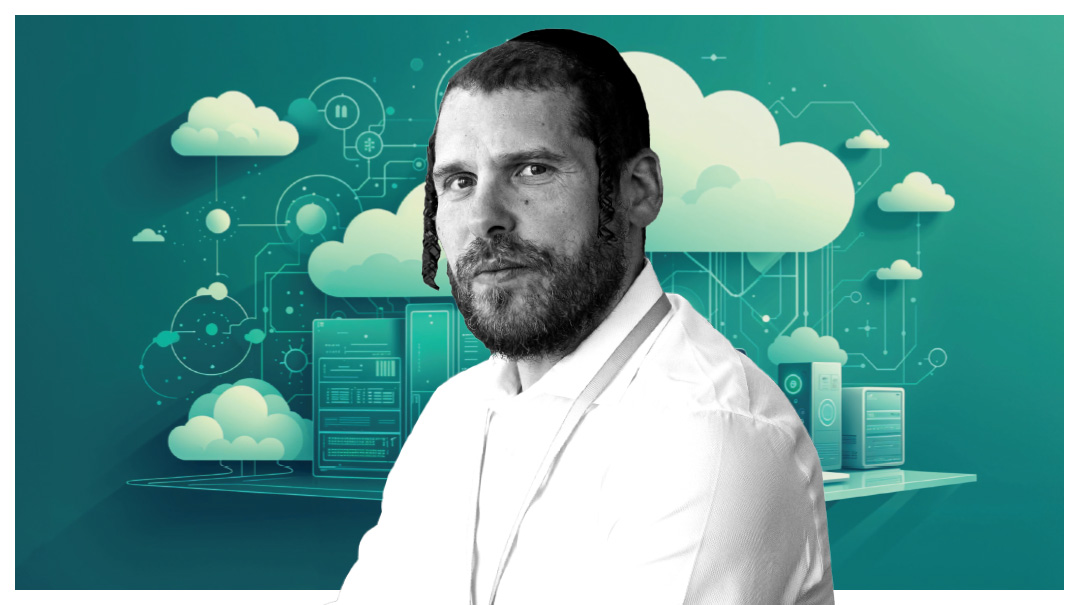Second Chances: Career 2.0
| July 30, 2024Bored? Uninspired? Itching for change? It’s never too late to recalibrate

Getting the itch to change careers isn’t necessarily the sign of a midlife crisis. While big changes are scary, the alternative can be dismal, especially if you have that niggling feeling you’re in the wrong seat, or you finally want to seek something more aligned with evolving values and interests. Follow the trajectories for four professionals who made the leap — and nailed the landing.
Flashy sports cars, cross-country moves, and dramatic career transitions are hallmarks of the fabled “midlife crisis.” The first time I received a phone call from a physician interested in a full-time job in the Jewish nonprofit sector, I chalked it up to “midlife crisis” and assumed it was a passing phase.
A few months later, a successful accountant emailed me and told me her kids were getting older and she wanted to shift tracks to a more meaningful career. I recommended that she find an organization to volunteer for and keep her day job.
Today, after 16-plus years of recruiting, I now take those calls seriously. I’ve met so many fascinating people who have made dramatic career shifts, many with great success and burning passion.
These changes might be prompted by a gradual buildup of boredom, itching for change and a new challenge. In other cases, a field that seemed supremely interesting to a college student proves to be less so in real life. Our career interests evolve as we begin working and are exposed to ancillary professionals and our eyes are opened to other areas of expertise. Finally, we sometimes outgrow the professions we chose on a personal level and seek something more aligned with evolving values and interests. Most importantly, Yad Hashem is always in the background, nudging us toward the place where we’re really supposed to be at each stage of life.
Choosing to start over in a new career can be scary. This is true whether the catalyst for the change is a niggling feeling that you’re in the wrong seat, an increasing despondency when you have to go into the office, or a glitzy new job offer on the other side. Big changes are scary, especially when income is on the line. However, staying in a profession that feels stagnant, boring, or unfulfilling is a dismal alternative.
Sahil Gaba, a software engineer at Google who also coaches candidates to ace technical interviews, calls this the “sunk cost fallacy.” A person can feel that he’s sunk so many years and so much money into his education, he simply can’t pivot into another field. “I worked so hard to gain entry into this field, and therefore, I need to make it work.”
But Sahil’s friend taught him a life-changing mantra: “In life, we have to choose our regrets — four to six years of pursuing the wrong degree, or 40 years in the wrong career.”
Ask Yoel, Tracy, Igor, and Rivkie — the best is yet to come!
Yoel Margolese
Following the Stepping Stones
Y
oel Margolese was at the top of the world. As the manager of Bike4Chai, the most sophisticated fundraising event in the frum nonprofit arena, Yoel had achieved undeniable success in his field. Together with Chai Lifeline’s CEO Rabbi Simcha Scholar and New Jersey regional director Rabbi Sruli Fried, Yoel conceptualized and grew a bike ride into a $10 million annual event and the highlight of frum fundraising. The event was being imitated by organizations around the country, and other executive directors were consulting with Yoel to help them build their own mega-rides.
Bike4Chai supporter and devoted Chai Lifeline lay leader Ralph Herzka saw Yoel’s core skill set of operational management and exceptional people skills. He believed Yoel’s skills would add value in the business world too and invited Yoel to join him in his business. Yoel was at a crossroads: On the one hand, he loved his job and always wanted to spend his time giving to the community. Other the other hand, he had maxed out his ability to innovate and challenge himself professionally in his current role. Joining a high-powered corporate environment was a tantalizing challenge. It also provided a path to greater financial stability, which became increasingly important as the kids grew older and marrying them off loomed on the horizon.
Yoel took the plunge and joined Ralph Herzka at Meridian. Working in a fast-paced, brand-new corporate environment was a big change. But soon, a major shakeout in the mortgage industry prompted Yoel to explore other roles. He joined Fasten Halberstam as director of operations, taking his managerial prowess to the accounting firm to streamline processes. After jumping right in and implementing key changes, Yoel decided the time had come to go out on his own. He joined with a partner, and together they now own Stiac Laundry, a uniform and textiles rental and laundry service.
Yoel is able to look back on his career and reflect how each opportunity led to the next one. Years in communal work enabled him to build vast expertise in operations and an expansive community network. A lay leader he was close to from his nonprofit days gave him entry into the fast-paced corporate world. Complex operational skills gleaned from running a multimillion-dollar bike ride with hundreds of riders prepared him professionally to run a uniform laundry and rental business. Years of marketing, sales, networking and fundraising experience at Bike4Chai gave Yoel the confidence to market his own business to his local community and to his extensive network developed from years at Chai Lifeline. Hashem prepared a path and Yoel was led from one experience to the next.
Tracy Weiss
From Fashion to Philanthropy
W
hen Tracy was in seventh grade, she started a business selling hair barrettes to friends and at sales parties in local homes. Ambitious 12-year-old that she was, Tracy brought her products to Bloomingdales and A&S and secured large orders that required hiring outside help to fulfill. With Mom roped in to do the purchasing and Dad tasked with the fiscal management, Tracy was able to focus on the fashion side of her business. Sitting with the children’s department buyer and negotiating her sale was a super exciting experience for young Tracy. At that moment, she decided that her future career would be in retail.
Years later, Tracy attended Fashion Institute of Technology and University of Maryland, earning a degree in fashion merchandising and textile science. Upon graduation, she joined Macy’s Executive Management Program and was soon overseeing two departments at a Macy’s in White Plains. When Tracy was offered a job as an associate buyer for Bergdorf Goodman, she got her entry into the world of high-level fashion.
Tracy lived in the world of European travel, fashion shows, and designers like Prada and Calvin Klein. She launched the sunglasses department at Bergdorf’s, created private label products branded under Bergdorf’s name, and launched the highly successful fifth-floor Accessory Department featuring up-and-coming designers. The job entailed high-level analysis of product flow, consumer purchasing, training salespeople, and pricing.
With her many successes, Tracy was recruited by Donna Karan to revitalize her accessory collection brand. Working on that was exciting and led to a sales role with DKNY Accessories, which was a popular brand at the time. Tracy was having a blast, working hard but growing in her career. She had a substantial clothing allowance, and an exciting travel schedule meeting with her retail accounts across the US.
Although she was enjoying her career immensely, her family life was changing. With her first baby on the horizon, she calculated the cost of a full-time nanny, dry-cleaning a professional wardrobe, commuting costs, and extra household help expenses. All those expenses left her with such a small take-home salary, working simply didn’t seem to pay off. Remote, hybrid, Zoom, Slack, and smartphones were all nonexistent concepts, and working a corporate job meant working in Manhattan for eight-plus hours daily. Her husband at the time was making a significant salary and encouraged her to stop working and stay home with the baby. Tracy and her husband decided she would resign from her job to be a full-time mom.
The family moved to an upscale neighborhood on Long Island and Tracy immediately got involved with the local JCC, synagogue, and UJA. Tracy served on the board of her synagogue, was a member of National Young Leadership Cabinet with UJA, volunteered weekly at a social services agency, and shared her time personally and philanthropically. Volunteer work became a major part of Tracy’s schedule, identity, and social life. Tracy’s priority was raising her two children and volunteering for the Jewish community.
Many years after leaving the workforce, Tracy found herself newly divorced, a single mom for two kids and without any income of her own. Searching for a job was hard; rejoining the workforce after so many years required deep introspection and humility. Going back to retail seemed like a natural choice, but a heartfelt conversation with a close friend led Tracy to realize that over her many years of volunteering, she had built an additional skill set in Jewish communal work.
Tracy called up the fundraiser who solicited her over many years and asked about professional openings at UJA. She landed a development job on the Wall Street team and found herself reporting to a woman at least ten years her junior. Tracy had to reorient herself and her family, from being a wealthy community member, a sophisticated retail executive, and an available stay-at-home mom, to becoming an entry-level development professional with full-time work responsibilities. This required checking her ego at the door and leaning on her parents for carpool runs, her kids for household help, and her inner drive to progress in a new work environment.
But after seven years at UJA, with her kids older and more independent, Tracy truly felt that she could take the best practices she learned and take on a national development role. She moved on to accept a director of development position with ORT America, which offered a global reach. With many significant philanthropic accomplishments under her belt, Tracy has truly “caught up” in the field and has held notable positions with United Hatzalah and now as director of development for SINAI Schools, working with funders and philanthropists who care about day school education for children with special needs.
Rejoining the workforce after full-time mothering was a challenge, but she is a role model for her children and an inspiration for other women looking to get back to work or change career paths. The best thing is Tracy gets to do what she loves — and get paid for it too.
Igor Meystelman
Following a Passion
I
gor’s journey from practicing family law to starting a new career as a relationship coach and therapist was a long, winding path that started with his own journey through marital therapy. When Igor’s wife broached the topic of marriage therapy as a means to connect on a deeper level, Igor agreed to “go along for the ride.” Igor immediately connected with the experience, and the couple spent five powerful years exploring their relationship, their own inner selves, and lingering emotions stemming from their childhoods.
Igor realized that his law career was a means of pleasing his father, but it didn’t connect with his own deepest talents and interests. Through reflection, he realized that what interested him most was utilizing his teacher’s voice, helping people make life-changing shifts to change their lives, and helping “hold space for other people’s journeys,” in therapy terminology. Igor’s rebbi, Rabbi Beryl Gershenfeld, has always emphasized a person’s responsibility to utilize all of his G-d-given talents to impact the world — and while Igor’s career in law was lucrative, it did not fulfill that mandate. With a deep desire to maximize his use of his strengths, Igor made the decision, with his wife’s solid support, to go back to school to become a certified family and couples’ therapist.
Balancing an existing law firm, a large family, and full-time school was challenging. It meant hiring another lawyer to take over the bulk of the workload and client relationships; overwhelming time commitments that included studying, classes, and law work; as well as a tighter budget for the entire family. But the end result brought Igor to a place of deep professional fulfillment and the sense that he could use his innate kochos in his work throughout the day.
Rivkie Kahn
From Side Jobs to All In
Rivkie Kahn’s upbringing in a secular yet studious Jewish family in Sacramento, California, instilled a deep focus on education and career aspirations. Following her graduation with a mathematics degree from Boston University, Rivkie embarked on a dynamic career in market research and data intelligence, rapidly ascending through the ranks at Fortune 100 giants like IBM and Amazon.
But Rivkie’s journey extends beyond career success; it’s a tale of profound personal transformation. Embracing mitzvah observance as a young professional, she married a ben Torah, and together they cultivated an open home and a dedication to the klal. Their Shabbos table regularly hosted over 20 guests, and they passionately taught classes that reignited connections for disenchanted young adults, even guiding couples toward marriage. Close involvement with engaged couples propelled Rivkie to train as a kallah teacher, to be able to better guide her students.
In time, Rivkie was asked to serve as Mikvah USA’s dedicated Brooklyn kallah teacher, a position in which she taught secular and observant brides alike. Shalom Task Force learned of Rivkie’s expertise in teaching kallahs with challenging backgrounds and recruited her in as an educator. Rivkie fit her teaching in around her demanding work schedule and family life.
In 2018, with the arrival of her twin boys, Rivkie made a pivotal decision, leaving her senior position at IBM to fully embrace her family and burgeoning communal responsibilities. Rivkie used her newfound time to play a crucial role in helping to build CORE Torah. She managed CORE’s network of over 2,500 mekarvos while developing a robust set of educational resources and materials for the education team.
Her impactful presence in the community caught NCSY’s attention. For over a year, NCSY pursued Rivkie, acknowledging her exceptional fusion of corporate acumen and kiruv dedication. She jumped into “corporate” kiruv full time, and wasted no time proving her capabilities. She revitalized Brooklyn NCSY, growing it from under 200 students to over 2,000 in less than two years. Her initiatives included forging strategic partnerships with new yeshivos, introducing specialized programs for the Russian and Syrian communities, and expanding programming to middle schoolers, college students, and parents. Recognizing her management abilities, culled from a decade of experience in corporate America, NCSY swiftly elevated her to the prestigious number two position at Southern NCSY, the organization’s largest region.
Rivkie’s personal and professional journeys have meshed in her current position at Southern — and she couldn’t be happier.
Shira Werblowsky is a seasoned executive recruiter with a practice focused exclusively on Jewish nonprofits. She has filled senior positions at the OU, Yachad, Olami, Chai Lifeline, Mayberg Foundation, and more.
(Originally featured in Mishpacha, Issue 1022)
Oops! We could not locate your form.







